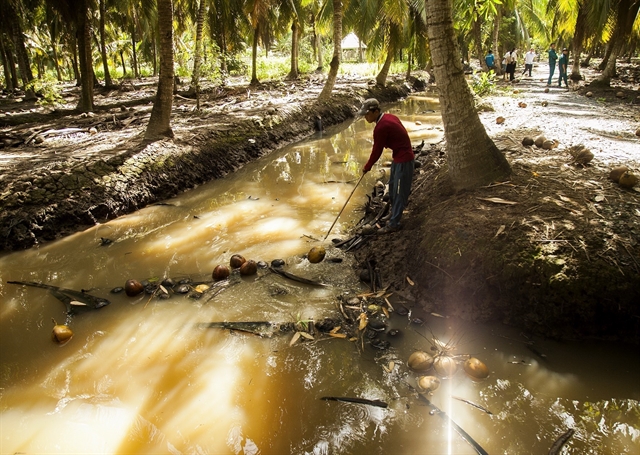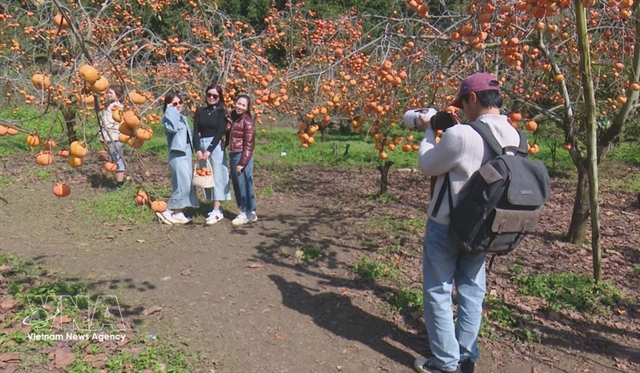 Society
Society

 |
| An organic coconut orchard in Bến Tre Province’s Thạnh Phú District. — VNA/VNS Photo Hồng Đạt |
HCM CITY — Major coconut growing provinces in the Cửu Long (Mekong) Delta are developing organic cultivation to improve their farmers’ incomes and meet market requirements.
Bến Tre, the region’s largest coconut growing province, aims to increase the area using organic farming to 20,100ha by 2025, according to its Department of Agriculture and Rural Development.
They will be grown mostly in Mỏ Cày Nam, Mỏ Cày Bắc, Châu Thành, Giông Trôm, Thạnh Phú, and Ba Tri districts.
Huỳnh Quang Đức, deputy director of the department, highlights the province's successful establishment of 921.2 hectares of new organic coconut cultivation this year, propelling the total area to an impressive 18,121ha.
Organic coconut now accounts for 23 per cent of the total cultivation area.
More than 12,880 hectares have received organic certificates, according to Đức.
The province has been pro-active in equipping coconut farmers with techniques for organic cultivation and fostering the production of organic fertilisers.
Notably, on a pilot basis, six concentrated coconut cultivation areas spanning 2,202 hectares have not only been effectively implemented but are also expanding.
Bến Tre is also urging farmers to establish co-operatives and co-operative groups, and strong ties with companies for streamlined coconut cultivation and sales.
The province has successfully inaugurated two new co-operatives this year, facilitating linkages among stakeholders to develop value chains encompassing 4,230ha of coconut.
Meanwhile, in Trà Vinh, the second largest coconut cultivation province in the delta, authorities are actively encouraging farmers to embrace organic methods and cultivate value chains.
Lê Văn Đông, deputy director of the Trà Vinh Department of Agriculture and Rural Development, said seven companies have formed partnerships with over 5,700 households with almost 5,000ha of organic coconut cultivation.
These companies have committed to purchasing the produce of the organic cultivation areas at 5-15 per cent higher than market rates.
Collaboratively, the department and localities in Trà Vinh are actively developing coconut cultivation areas specifically earmarked for official export to China.
With around 90,000 households cultivating a combined area of 27,380ha, Trà Vinh has 24 coconut cultivation areas that have received production codes for exports.
Notably, the cultivation of organic coconuts has yielded superior outcomes, delivering higher yields, disease resistance, lower production costs, and increased profits for farmers.
In Vĩnh Long Province, farmer Nguyễn Thị Hạnh in Vũng Liêm District’s Trung An Commune transitioned to organic cultivation in 2021 and has witnessed significant improvements in her 3,000-square-metre coconut orchard.
“Besides economic efficiency, growing organic coconut also helps protect the environment and the health of growers and consumers, and meet the market requirements of green, clean and safe products,” she said.
Hà Văn Thái, chairman of the Trung An Commune People's Committee, underscored the growing trend of organic coconut cultivation, with farmers recognising the substantial benefits.
Recognising this shift towards organic practices as an imperative, coconut processing companies emphasise the need for sustainable growth and market expansion.
Nhan Tuyết Trinh, a representative of Thabico Tiền Giang Food Industry Joint Stock Company, highlights the importance of developing organic coconut cultivation areas.
The company, with a processing capacity of 300,000 coconuts daily, is collaborating with coconut-growing communes in Vũng Liêm District to expand organic cultivation areas.
The criteria for organic farming include not using chemical fertilisers and pesticides and not breeding animals in them, she said.
Her company is co-operating with Vũng Liêm District’s coconut growing communes to expand organic farming, she added. VNS




